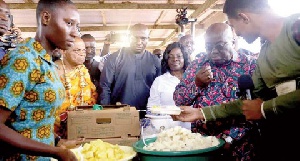President Akufo-Addo tasting some pineapples at the farm for the ‘One District, One Factory’ project at Ekumfi
Not even the sudden rains could stop the ground-breaking for the commencement of the first of the ruling New Patriotic Party (NPP) government’s flagship programmes – the ‘One District, One Factory’ (1D1F) – at Ekumfi, the home of former President John Evans Atta Mills, in the Central Region.
Moments after the launch of the much talked-about initiative at Ekumfi-Eyisem yesterday, the rains started, almost bringing proceedings to an abrupt end.
At the time, President Akufo-Addo had been scheduled to visit the project site for the construction of the first of many factories to be established in the 216 districts spread across the length and breadth of the country.
But a determined President Akufo-Addo would not give in to the rains; he braved all odds to cut the sod for the beginning of the construction of the factory, which has been sited in a location almost two-and-a-half kilometers away from the town.
Upon reaching the site, the Ghanaian leader alighted from his car and walked straight to the ground where a shovel and a pick-axe had been placed awaiting his arrival to break the ground under the policy to industrialise the country.
There was the usual pomp and pageantry that has often been associated with the launch of such initiatives; but this time round with modesty, graced by traditional and religious rulers with a considerable number of government officials on hand to complement the exercise.
The ‘1D1F’ as the programme has come to be known, was initiated by President Akufo-Addo as part of measures to reverse the slow economic growth in all the 216 districts in the country.
The initiative aims to achieve this through a massive private sector-led nationwide industrial revolution which would equip and empower communities to utilize their local resources in manufacturing products that are in high demand both locally and internationally.
Expectation
This is expected to enable the country to reap the rewards of industrialization, increase agricultural and manufacturing output, reduce reliance on imports and increase food availability, as well as generate employment.
Speaking at the event, President Akufo-Addo recalled how he was literally ridiculed and insulted when he promised to undertake the initiative during the 2016 electioneering campaign.
Naysayers
“As has become the norm over the years, anytime I roll out policies and programmes, it is met with the usual cynical chants of ‘it cannot be done; he is lying; it is a vote buying gimmick; it is not possible,’” Nana Addo noted.
However, he said Ghanaians “were discerning and believed in the vision, and believed it could be done,” which culminated in the decisive victory won by the New Patriotic Party in the last general election.
For him, therefore, the launch of the initiative was not about the NPP, neither was it about any other political party.
Instead, he indicated, “It is about the development of Ghana.
“This is in fulfillment of the pledge I made to you on Tuesday, 1st November, 2016. As you have heard from the earlier speakers, this project has been well-planned and well-thought through, with the raw materials needed for the successful implementation of this project already present, and an out-grower scheme also in place.”
Target
With a capacity to process and package about 80 tonnes of fruits per day, the factory is expected to process a total of about 25,600 tonnes of fruits per year.
A total of 250 persons are expected to be employed at the factory, with over 5,000 jobs, direct and indirect, being created as a result.
Meanwhile, a programme framework which sets the modalities for the implementation of the policy has been prepared.
The president revealed that “The Technical Support Group for the programme has already reviewed over 330 business plans received for the ‘One District, One Factory’ initiative.”
The ‘Asempa’ Budget 2017 has allocated an amount of $100 million as government contribution, either as equity or in kind support, for the establishment of the factories.
An additional amount of $340 million has been leveraged from local financial institutions for the programme while the government, in collaboration with the Association of Ghana Industries (AGI), has also arranged a Suppliers Credit Facility for $2 billion from China to provide equipment, machinery and other facilities in support of the programme.
Thus, far, about 59 percent of these applications are from the manufacturing sector, whilst 33 percent are from the agri-business sector.
It is envisaged that 51 districts would start actual implementation of their enterprises by the end of the year, with the potential to generate about 80,000 direct and indirect jobs.
For this and other reasons, President Akufo-Addo was sure “it is now clear that this programme is destined to succeed.”
He called for all hands to be on deck to support this and other initiatives of his government to help develop the country.
Business News of Saturday, 26 August 2017
Source: dailyguideafrica.com
Nana kicks off industrial revolution
Entertainment












